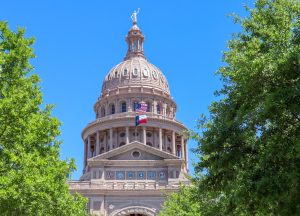Social media platforms have won two major legal battles, albeit preliminary, against US laws that seek to prevent major techs from removing “idea” content even if it’s offensive.
The U.S. Supreme Court on Tuesday outlawed the Republican-backed Texas law that was suspended late last year but went into effect in May in the state with the backing of Governor Greg Abbott. The court’s decision suspends the law until a decision is made on the validity of the text.
A similar bill submitted in Florida last week was found unconstitutional by an appeals court — a victory for social media companies accused by supporters of former President Donald Trump of “discriminating against conservative thought.”
Laws seek to prevent ‘censorship’ of Republicans on social media
Both Texas and Florida bills seek to prohibit social media platforms from blocking or banning users based on posts that spread “viewpoints” – even if this violates the networks’ terms of use such as hate speech, conspiracy theories, and fake news.
Last year, Texas Governor Greg Abbott passed legislation on the grounds that major techs should limit their autonomy over what content and users they remove from their bases, accusing them of deliberately censoring conservatives and Republicans around the world.
However, by a vote of 4 to 5, the Supreme Court decided to suspend the law pending further debate on its constitutionality.
This week’s vote did not examine the legality of the project, only responding to a request submitted by two groups representing social media companies such as Twitter, Facebook and YouTube.
In May, the 5th U.S. Court of Appeals re-established the law in the state, and in response, groups representing platforms – the Computer and Communications Industry Association (CCIA) and NetChoice – triggered the highest example of the U.S. judiciary. Protect big technology.
Read more
Controversial law banning social networks from banning users for ‘viewpoints’ is back in effect in Texas
“No online platform, website or newspaper should be instructed to give a specific speech by government officials,” said Matt Schruers, President of the Computer and Communications Industry Association (CCIA), following the Supreme Court ruling. “This has been a fundamental principle of our democracy for over 200 years.”
In the union’s joint lawsuit against Netchoice and Texas, the CCIA statement of the Supreme Court stood in our favor: https://t.co/rRQOkz6GVx
— Matt Schruers (@MSchruers) May 31, 2022
In NetChoice and CCIA’s lawsuit filed with the Supreme Court, tech companies described the Texas law as “an unprecedented attack on the editorial discretion of private websites (such as Facebook.com, Instagram.com, Pinterest.com, Twitter.com), Vimeo.com and YouTube.com) is fundamentally changing its business models and services”.
For companies, the government’s proposal poses “serious problems” to the American First Amendment, which protects freedom of speech and the press, because it wants to “regulate a global phenomenon” represented by social networks and the aggressive attacks/posts that occur on them.
In the document submitted to the court, the companies also argue that Texas law is “unconstitutional” and risks causing “irreparable damage” to the internet and social networks themselves.
“While the judiciary scrutinizes these important issues, platforms should not force the government to spread the most despicable speech imaginable, such as white supremacist manifestos, Nazi rants, Russian state propaganda, Holocaust denial and the recruitment of terrorist organizations.”
read it too
NY prosecutor launches investigation into social media role in Buffalo attack
Republicans fend off objections from platforms in Texas
Texas Attorney General, Republican Ken Paxton defended himself against social media platforms’ objections to state law violating the First Amendment. According to him, the project only focuses on the behavior of companies.
Paxton argued that because they are “descendants of the telegraph and telephone companies in the 21st century,” the big technology companies should be treated as “ordinary vehicles”, subject to government regulation by the essential nature of the services they provide to Americans.
In addition to the attorney general, Texas legislation has the backing of other Republican politicians who accuse social networks of having an “anti-conservative bias” and exercising censorship. The companies vehemently deny these claims.
The biggest victim of this bias will be Donald Trump, who was excluded from mainstream networks last January for his posts inciting the Capitol invaders.
Other politicians associated with him also lost their accounts or were temporarily suspended.
read it too
Trump Returns, Layoffs, ‘Project X’: What Is Elon Musk Planning For Twitter?
The regulation is tailored for big tech, as it applies to companies with more than 50 million monthly active users in the US. And it requires platforms to account for illegal or potentially policy-violating content.
The text also provides for the establishment of a complaints system where citizens can appeal content removal decisions they consider unfair.
In Texas and other states that have passed similar laws, tech companies have teamed up to block the passage of texts.
The companies argue that such laws can “slow down efforts to remove objectionable content,” such as terrorism and violence.
For the Texas governor and other Republicans who drafted the law, it will actually prevent “conservative views” from being banned from social media.
Florida’s Social Media Law Is Unconstitutional
Similar to Texas law, Florida’s social media law has proposed penalizing major techs that remove content and users because of their “opinions,” even if it goes against the platform’s usage policies.
The Atlanta-based 11th U.S. Court of Appeals unanimously ruled on May 23 that most of the state’s text violated the First Amendment and was therefore unconstitutional.
In a detailed reason 67 pages Three judges—all nominated by Republican presidents—rejected many of the legal arguments conservative states use to support social media laws. The opinion was written by Judge Kevin Newsom, appointed by former President Donald Trump.
In the ruling, the court concluded that it was “overkill” for Florida Governor, Republican Ron DeSantis and his state colleagues to “tell social media companies how to operate under the Constitution’s guarantee of freedom of speech”:
“Simply put, with minor exceptions, the government cannot tell a private person or organization what to say or how to say it.
We believe that social media companies – even the largest ones – are quite likely to be private actors to whom the First Amendment protects their rights.”
The court’s understanding has been celebrated by business groups representing big technologies, as well as by organizations advocating freedom of the press such as Reporters Without Borders (RSF).
This law will prevent social media companies like Facebook and Twitter from banning politicians, and therefore severely limit platforms’ ability to remove accounts that spread misinformation and misinformation.”
“While we agree that the platforms that shape and structure the online space should be more transparent and respect democratic principles, we are concerned that states like Florida and Texas tend to protect the spreaders of disinformation rather than combat the information chaos. “
The CCIA said Florida’s decision represents a victory for internet users and freedom of speech in general – particularly regarding potentially offensive content.
“When a digital service takes action against problematic content on its website, whether it is extremism, Russian propaganda, or racism and abuse, it is exercising its right to freedom of expression.”
read it too
source: Noticias


